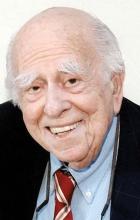Do you love being a rheumatologist enough to still be seeing patients, teaching, and conducting research when you are 100 years old? May you live long enough to find out the answer to that question.
Rheumatologist Dr. Ephraim P. Engleman, who turned 100 years old in March, loves his specialty enough to still be very active in it. He is the longest tenured professor in any medical specialty at the University of California, San Francisco, where he is director of the Rosalind Russell Medical Research Center for Arthritis, and he continues to see patients 3 days a week.
When asked in an interview with this news organization what he considers to be the most important advances in rheumatology since he began his career in the 1940s, Dr. Engleman listed without reservation, "the discovery and proper use of cortisone, an invaluable drug in all medical specialties including rheumatology and joint replacements." Dr. Engleman also included the development of biologic therapy, noting "its long-term undesirable effects [having] not yet been determined." Anticytokine therapy also made the list of important advances in rheumatology.
As for the greatest challenges facing the specialty, Dr. Engelman listed "lack of national recognition of the rheumatologist’s critical role in the optimal management of patients with musculoskeletal diseases, the commonest of the chronic disorders. Furthermore, the kinds of services provided by rheumatologists are not adequately reimbursed in contemporary health insurance; thus, it is difficult for many rheumatologists to sustain viable practices."
He is touching the future by endowing the ACR REF/Ephraim P. Engleman Resident Research Preceptorship with the American College of Rheumatology Research and Education Foundation. The grant is $15,000. The deadline for online applications is Feb. 1, 2012. The purpose of the grants is to attract promising physician scientists to the field of rheumatology.
Dr. Engleman was born in San Jose, Calif. While an undergrad at Stanford University, he had a brief musical career as a violinist. He continues to play to this day.
He graduated with his M.D. from Columbia University, New York, in 1937. Following medical residencies at University of California, San Francisco, and Tufts University, Boston, he was a fellow at the Massachusetts General Hospital where he received his training in rheumatology with Dr. Walter Bauer, professor of medicine at Harvard. Dr. Engelman recalls with affection his mentor Dr. Bauer, a pioneer in arthritis research. Anyone who completed a fellowship under him was guaranteed a successful career in rheumatology.
During World War II, Dr. Engelman saw military service as a major, serving as chief of the Army’s Rheumatic Fever Center.
Any impulse he may have had to retire has been blocked by recognition of his career achievements by his peers in academia and elsewhere. He served as president of a number of organizations including the American Rheumatism Association, now the American College of Rheumatology, from 1962-1963; the National Society of Clinical Rheumatology (1967-1969); and the International League Against Rheumatism (1981-1985).
From 1975-1976, Dr. Engelman chaired the congressionally mandated National Commission on Arthritis, a task force charged with recommending remedies for the inadequate status of arthritis research, teaching, and patient care in the United States. Among its recommendations were the creation of what is now the Institute of Arthritis, Musculoskeletal, and Skin Diseases and tripling of the ongoing federal budget for arthritis research. The task force’s report also called attention to the surprising number of medical schools with no curriculum in rheumatology.


